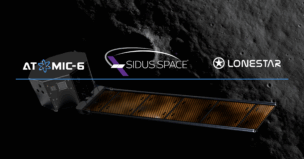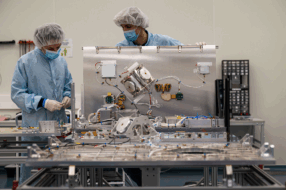CesiumAstro announced this morning that it is officially getting into the in-flight connectivity (IFC) market.
The company is planning to test a flat active phased array payload that can connect with satellites in orbit more easily and effectively than current systems, and has several demonstrations aboard Airbus craft set for the coming year.
Active phased arrays
Usually, the dishes that provide satellite connectivity to aircraft are housed within a rounded bubble, and they’re mechanically steered to maintain a strong connection as the plane maneuvers. These systems are prone to losing connection with satellites as they pass out of view or as the plane banks.
Cesium’s solution to these problems uses multiple electronically steered beams to maintain a “make-before-break” connection, meaning that it autonomously creates a new connection with a service satellite before breaking its connection with the last one. The arrays provide a more reliable, resilient higher-throughput internet connection, CesiumAstro CEO Shey Sabripour told Payload.
Keeping it cheap
“You can build a product for space, but now you have to take that product—which for LEO has to be already an order of magnitude cheaper than traditional aerospace—and now you have to bring it down another order of magnitude to be affordable by commercial aircraft providers,” Sabripour said. “That’s really the key.”
The company began its conversation with Airbus three years ago, Sabripour said, and expects to ship its first models in the next few months for testing.
Looking ahead: The company is planning several demonstrations with Airbus this year, including a demo from a rooftop, a moving car, and a helicopter.
CesiumAstro is hoping to secure FAA certification of its arrays by Q1 2025, and begin commercial service soon after.




